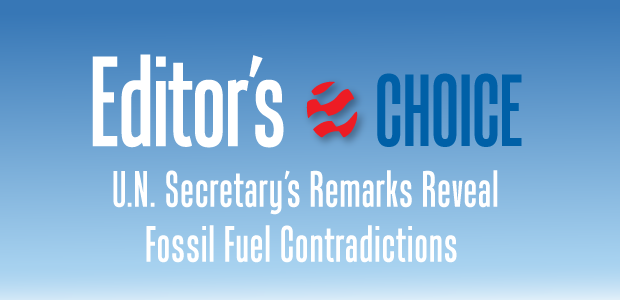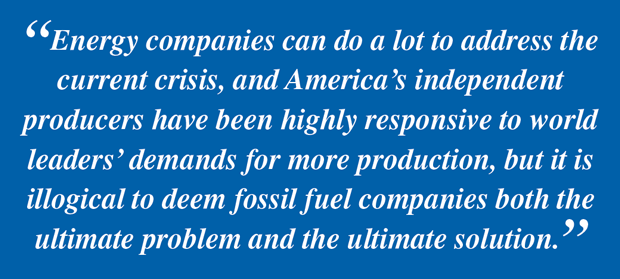
U.N. Secretary’s Remarks Reveal Fossil Fuel Contradictions
By Jeff Eshelman
U.N. Secretary General Antonio Guterres wants energy companies to save the day, right before he puts them out of business.
Secretary Guterres added to the chorus of mixed messages during his opening speech at the U.N. General Assembly in late September, and at a time of remarkable political and economic instability–driven primarily by the global energy crisis–Guterres used his platform to criticize the energy industry. In his remarks, Guterres made a not-so-subtle threat to energy companies and firms that do business with energy companies.
“It’s high time to put fossil fuel producers, investors and enablers on notice,” he asserted.
Guterres followed up with a call for countries to tax energy companies’ profits and redistribute the money to communities suffering the effects of climate change.
“I am calling on all developed economies to tax the windfall profits of fossil fuel companies,” he urged. “Those funds should be redirected in two ways: to countries suffering loss and damage caused by the climate crisis; and to people struggling with rising food and energy prices.”
Guterres’s proposal is an example of the kind of magical thinking common among fringe Democrats in the United States–on one hand, energy companies’ profits are evidence of a malicious plot to hurt consumers, while, on the other hand, they are the solution to nearly every economic and humanitarian policy challenge brought on by Russia’s invasion of Ukraine and the ensuing energy crisis.
A windfall profit tax, or, as the European Union has rebranded it, a “solidarity contribution,” is an extreme emergency measure that is often time-bound and paired with other cost-of-living provisions. The versions of a windfall profit tax that have been proposed by various fringe Democrats in the United States have been uniformly rejected by a diverse and bipartisan group of policy experts and economists.
But regardless of how different nations evaluate and implement emergency taxation measures, Guterres’s proposal is a massive overreach that extends beyond the realm of the possible. Guterres appears to conflate the purpose of the United Nations (“to achieve international cooperation in solving international problems of an economic character”) with the capabilities of sovereign, democratic governments.
Guterres’s proposal also contradicts experts within his organization. Earlier this year, top U.N. food and agriculture economist Máximo Torero warned against the human rights consequences of a hasty shift away from fossil fuels:
“If you switch the energy mix too quickly, you will increase the price of energy. Then you will increase the price of fertilizers, you increase the price of food, more people dying of hunger. So, what do you want?”
Torero warned world leaders of the dangers of transitioning away from fossil fuels without assessing all the trade-offs. “We need to understand that actions have consequences,” he advised. “You cannot go just with the goal of climate without assuming that there is not an interlinkage over hunger.”
But Guterres’ speech did not follow the same logic, as the secretary said “we must urgently address the global food fertilizer crunch” in order to prevent mass hunger. He argued that the fertilizer market must be “stabilized,” and that the impacts of high natural gas prices on fertilizer must be “addressed.”
The fertilizer shortage is by no means a hypothetical problem. During the past year, Sri Lanka has suffered severe inflation, food shortages and political unrest resulting from the government’s decision to ban chemical fertilizers for economic and environmental reasons.
This begs the question of how Secretary Guterres plans to address the long-term impacts of high natural gas prices on fertilizer supply while simultaneously discouraging natural gas production, investment and use.
Instead of facing the facts, Guterres proposes that governments tax fossil fuel profits, use those profits to address the cross-border impacts of climate change and global hunger, and at the same time, rapidly phase out fossil fuel production and use.
Energy companies can do a lot to address the current crisis, and America’s independent producers have been highly responsive to world leaders’ demands for more production, but it is illogical to deem fossil fuel companies both the ultimate problem and the ultimate solution.

JEFF ESHELMAN is president and chief executive officer of the Independent Petroleum Association of America and the founder/executive vice president of Energy in Depth. Along with more than two decades at IPAA, he previously worked at the Defense Logistics Agency, the White House Office of National Drug Control Policy and three public affairs firms.
For other great articles about exploration, drilling, completions and production, subscribe to The American Oil & Gas Reporter and bookmark www.aogr.com.
















